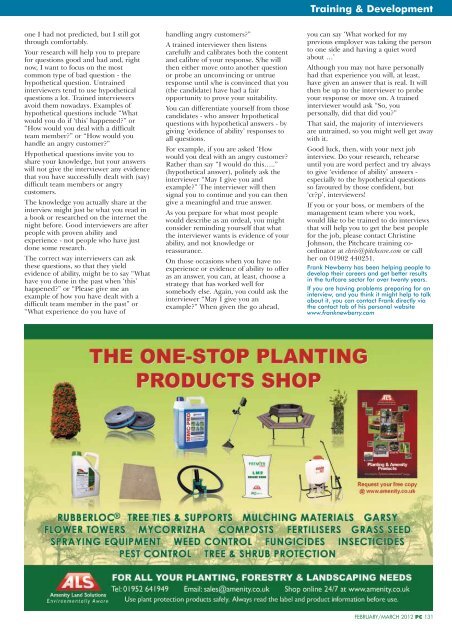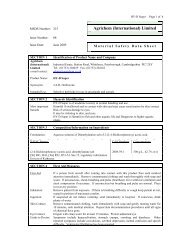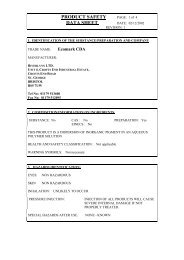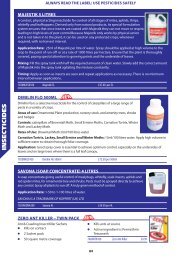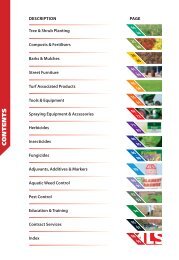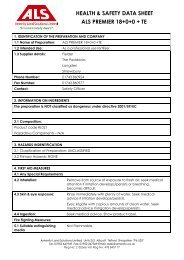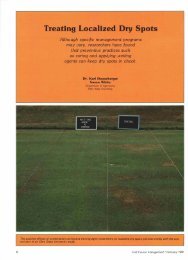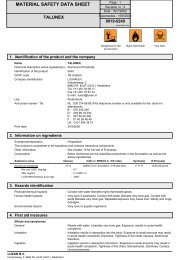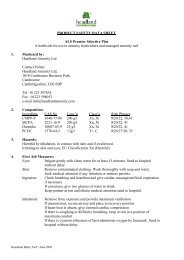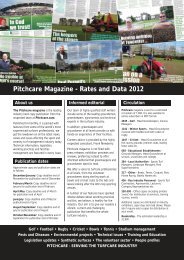these Open Championship Clubs choose to relief grind - Pitchcare
these Open Championship Clubs choose to relief grind - Pitchcare
these Open Championship Clubs choose to relief grind - Pitchcare
You also want an ePaper? Increase the reach of your titles
YUMPU automatically turns print PDFs into web optimized ePapers that Google loves.
one I had not predicted, but I still got<br />
through comfortably.<br />
Your research will help you <strong>to</strong> prepare<br />
for questions good and bad and, right<br />
now, I want <strong>to</strong> focus on the most<br />
common type of bad question - the<br />
hypothetical question. Untrained<br />
interviewers tend <strong>to</strong> use hypothetical<br />
questions a lot. Trained interviewers<br />
avoid them nowadays. Examples of<br />
hypothetical questions include “What<br />
would you do if ‘this’ happened?” or<br />
“How would you deal with a difficult<br />
team member?” or “How would you<br />
handle an angry cus<strong>to</strong>mer?”<br />
Hypothetical questions invite you <strong>to</strong><br />
share your knowledge, but your answers<br />
will not give the interviewer any evidence<br />
that you have successfully dealt with (say)<br />
difficult team members or angry<br />
cus<strong>to</strong>mers.<br />
The knowledge you actually share at the<br />
interview might just be what you read in<br />
a book or researched on the internet the<br />
night before. Good interviewers are after<br />
people with proven ability and<br />
experience - not people who have just<br />
done some research.<br />
The correct way interviewers can ask<br />
<strong>these</strong> questions, so that they yield<br />
evidence of ability, might be <strong>to</strong> say “What<br />
have you done in the past when ‘this’<br />
happened?” or “Please give me an<br />
example of how you have dealt with a<br />
difficult team member in the past” or<br />
“What experience do you have of<br />
handling angry cus<strong>to</strong>mers?”<br />
A trained interviewer then listens<br />
carefully and calibrates both the content<br />
and calibre of your response. S/he will<br />
then either move on<strong>to</strong> another question<br />
or probe an unconvincing or untrue<br />
response until s/he is convinced that you<br />
(the candidate) have had a fair<br />
opportunity <strong>to</strong> prove your suitability.<br />
You can differentiate yourself from those<br />
candidates - who answer hypothetical<br />
questions with hypothetical answers - by<br />
giving ‘evidence of ability’ responses <strong>to</strong><br />
all questions.<br />
For example, if you are asked ‘How<br />
would you deal with an angry cus<strong>to</strong>mer?<br />
Rather than say “I would do this…..”<br />
(hypothetical answer), politely ask the<br />
interviewer “May I give you and<br />
example?” The interviewer will then<br />
signal you <strong>to</strong> continue and you can then<br />
give a meaningful and true answer.<br />
As you prepare for what most people<br />
would describe as an ordeal, you might<br />
consider reminding yourself that what<br />
the interviewer wants is evidence of your<br />
ability, and not knowledge or<br />
reassurance.<br />
On those occasions when you have no<br />
experience or evidence of ability <strong>to</strong> offer<br />
as an answer, you can, at least, <strong>choose</strong> a<br />
strategy that has worked well for<br />
somebody else. Again, you could ask the<br />
interviewer “May I give you an<br />
example?” When given the go ahead,<br />
Training & Development<br />
you can say ‘What worked for my<br />
previous employer was taking the person<br />
<strong>to</strong> one side and having a quiet word<br />
about …’<br />
Although you may not have personally<br />
had that experience you will, at least,<br />
have given an answer that is real. It will<br />
then be up <strong>to</strong> the interviewer <strong>to</strong> probe<br />
your response or move on. A trained<br />
interviewer would ask “So, you<br />
personally, did that did you?”<br />
That said, the majority of interviewers<br />
are untrained, so you might well get away<br />
with it.<br />
Good luck, then, with your next job<br />
interview. Do your research, rehearse<br />
until you are word perfect and try always<br />
<strong>to</strong> give ‘evidence of ability’ answers -<br />
especially <strong>to</strong> the hypothetical questions<br />
so favoured by those confident, but<br />
‘cr?p’, interviewers!<br />
If you or your boss, or members of the<br />
management team where you work,<br />
would like <strong>to</strong> be trained <strong>to</strong> do interviews<br />
that will help you <strong>to</strong> get the best people<br />
for the job, please contact Christine<br />
Johnson, the <strong>Pitchcare</strong> training coordina<strong>to</strong>r<br />
at chris@pitchcare.com or call<br />
her on 01902 440251.<br />
Frank Newberry has been helping people <strong>to</strong><br />
develop their careers and get better results<br />
in the turfcare sec<strong>to</strong>r for over twenty years.<br />
If you are having problems preparing for an<br />
interview, and you think it might help <strong>to</strong> talk<br />
about it, you can contact Frank directly via<br />
the contact tab of his personal website<br />
www.franknewberry.com<br />
FEBRUARY/MARCH 2012 PC 131


